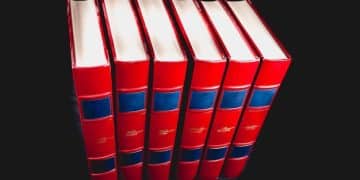Avoid These 3 Common Mistakes When Creating Your Novel-Writing Reading List

Creating a novel-writing reading list is beneficial for aspiring authors, but common mistakes such as selecting books only by famous authors, focusing solely on the genre you write in, or disregarding critical reviews can hinder your growth as a writer; learning to avoid these pitfalls enhances your development and provides a well-rounded literary education.
Embarking on the journey of novel writing is an exciting venture, but it’s crucial to learn from the masters. Creating a comprehensive reading list is a key step in this process. However, many aspiring authors stumble when selecting their reading material. By learning how to avoid these 3 common mistakes when creating your novel-writing reading list, you’ll set yourself up for success.
Mistake 1: Only Reading Books by Famous Authors
It’s tempting to fill your reading list with only the works of famous authors. After all, they’ve achieved widespread success, so their books must hold the key to writing a great novel, right? While reading renowned authors is beneficial, it’s a mistake to limit your selection solely to them.
There are many reasons why branching out beyond the well-known is essential for your development as a writer. Let’s explore some of them.
Exposure to Diverse Styles
Reading only famous authors can create a limited perspective on writing styles. Often, established authors have already defined their style and stuck with it for years, maybe decades, without adapting to the changes in the market. Newer authors may be more in tune with current trends.
Discovering Hidden Gems
Many lesser-known authors have produced exceptional works that haven’t received widespread recognition. These hidden gems can offer unique insights and inspiration that you might miss if you stick only to the classics or top-selling novels. They are great for writers getting started.
- ✅ Exploring indie authors can expand your literary horizons.
- ✅ Non-mainstream books often experiment with narrative structures and themes.
- ✅ Award-winning, yet lesser-known, titles offer fresh perspectives.
- ✅ Diversifying your reading list helps you find your unique voice.
In conclusion, broadening your reading list beyond famous authors opens you up to diverse styles, unique perspectives, and hidden literary gems that can enrich your understanding and approach to writing.
Mistake 2: Exclusively Focusing on Books in Your Genre
Another common mistake is focusing solely on books within your chosen genre. If you’re writing a science fiction novel, it might seem logical to only read science fiction. However, restricting yourself to one genre can limit your creative growth and understanding of storytelling.
Reading widely across different genres is essential for developing a well-rounded understanding of storytelling. Here’s why:

Learning from Different Techniques
Each genre offers unique storytelling techniques and conventions. By exploring genres outside your own, you can discover new ways to structure plots, develop characters, and build tension. For instance, you might find that crime or suspense novels use plot twists in a way that could benefit your book.
Cross-Genre Inspiration
Reading genres outside of your comfort zone can spark unexpected ideas and inspiration. Combining elements from different genres can lead to innovative and original stories. Subverting genre expectations can also be a great way to make your writing stand out.
- ✅ Gain insight into crafting compelling mysteries by exploring crime novels.
- ✅ Understand character development from literary fiction.
- ✅ Learn pacing from the thriller genre.
- ✅ Draw inspiration for world-building from fantasy novels.
In short, venturing beyond your specific genre can expose you to different techniques, inspire unique ideas, and help you build a more profound understanding of storytelling. Expanding your reading horizons can enhance your creativity and broaden your writing skills.
Mistake 3: Ignoring Critical Reviews and Recommendations
Many aspiring authors disregard critical reviews and recommendations when building their reading list. Whether they rely solely on personal recommendations or ignore professional critiques, they miss out on valuable insights that can refine their selections.
Paying attention to critical reviews and recommendations can significantly enhance the quality of your reading list. Here’s the reasons why:
Objective Perspectives
Critical reviews provide objective assessments of a book’s strengths and weaknesses. Professional reviewers analyze elements such as plot, character development, writing style, and thematic depth, offering insights that personal recommendations might overlook.
Uncovering Hidden Flaws
Recommendations are great, but sometimes biased, and can miss crucial flaws. Critical reviews can expose common issues like inconsistent pacing or underdeveloped characters, helping you make more informed choices.

Let’s break down these reasons further to understand why they matter so much!
Accessing Expert Opinions
Literary critics bring extensive knowledge and experience to their reviews. Their expertise can guide you toward high-quality literature and away from poorly written or derivative works.
- ✅ Use book review websites and publications to find expert opinions.
- ✅ Pay attention to recurring themes and criticisms in multiple reviews.
- ✅ Consider reviews from different sources to gain a balanced perspective.
- ✅ Compare critical reviews with reader reviews for insight.
To summarize, considering diverse reviews and viewpoints enables you to make well-informed selections, avoid potential disappointments, and discover books that truly contribute to your growth and understanding of novel writing.
Crafting a Balanced Novel-Writing Reading List
Now that we’ve covered the common mistakes, let’s discuss how to create a balanced and effective novel-writing reading list. Balancing your reading choices ensures a broad literary foundation, allowing you to learn from various perspectives and techniques.
Creating a balanced reading list involves paying attention to different facets to provide yourself with a well-rounded literary education. Here’s how to approach it:
Include Contemporary and Classic Works
Reading both contemporary and classic novels provides you with a perspective on modern trends and timeless storytelling. Contemporary works reflect current cultural trends, while classical novels offer insights into enduring literary techniques.
Mix Genres
Deliberately include multiple genres so you can gain a nuanced understanding of writing and storytelling. This strategy helps you understand how different genres approach plot, character development, and thematic exploration, opening doors to new, more creative ideas.
- ✅ List historical novels to understand world-building and setting.
- ✅ Select thrillers to learn the art of suspense and pacing.
- ✅ Include literary fiction for character development and thematic depth.
- ✅ Pick humorous books to add comedic elements to your projects.
In a nutshell, balancing your reading list by including contemporary and classic works and mixing genres creates a rich literary foundation, fostering creativity and enhancing your storytelling abilities.
Utilizing Your Reading List to Improve Your Writing
Creating a reading list is just the first step. To truly benefit from it, you need to actively engage with the material. Utilizing this list to improve your writing involves thoughtful analysis and practical application of what you learn. Analyzing writing techniques will help you implement new skills in your own work.
Take Notes
While reading, take notes on aspects such as plot structure, character development, dialogue, and writing style. These notes will serve as a reference for learning and refining your own craft. Focus on techniques that resonate with you and consider how you might apply them to your writing.
Analyze Character Arcs
Character development is a crucial element of effective storytelling. Pay close attention to how authors develop their characters, including their motivations, flaws, and growth throughout the story. Look at the use of subtext, or indirect dialogue, to highlight the character’s personality. Then, consider a plan to implement similar developments into your own characters!
- ✅ How does the author build tension and resolve conflicts?
- ✅ How does the author use setting to enhance the story?
- ✅ How does the author create a unique voice and style?
- ✅ What specific techniques can you adopt in your own writing?
To summarize, actively engaging with your reading list involves taking detailed notes, analyzing effective writing techniques, and practicing these techniques in your writing so you can maximize the knowledge you acquired and improve your writing skills.
The Long-Term Benefits of a Broad Reading List
The benefits of a broad reading list extend far beyond immediate improvements in your writing. A well-curated reading list fosters long-term growth, creativity, and a deeper understanding of the craft. Over time, you develop a unique writing voice.
Enhanced Creativity
Exposure to diverse styles, genres, and perspectives fuels creativity. It encourages you to think outside the box and experiment with new ideas. Reading widely expands your mental toolkit, providing you with a greater range of techniques and approaches to draw upon.
Greater Analytical Skills
Broad reading hones your analytical skills. You become adept at identifying the strengths and weaknesses of different writing styles and techniques. This ability translates improves both your writing and your critical feedback on other works.
- ✅ Keep your reading list updated with new and diverse titles.
- ✅ Continually analyze and reflect on what you learn from each book.
- ✅ Share your insights and discoveries with the community.
Reading diversely encourages you to think differently, hones your analytical abilities, and cultivates a long-lasting love for writing, making you a more skilled and insightful author and a well-rounded individual.
| Key Point | Brief Description |
|---|---|
| 📚 Limit Author Focus | Don’t restrict yourself to only famous authors. Venture out and explore other authors! |
| 🌐 Genre Mixing | Reading various genres helps you gain a nuanced understanding of writing techniques. |
| 🧐 Pay Attention to Reviews | Critical reviews help with making informed decisions and discovering books. |
| ✍️ Active Reading | Take notes and analyze what you are reading. Apply new skill in your writing. |
FAQ
▼
Reading outside your genre may seem counterintuitive, but it broadens your creative horizons. You’ll discover new writing techniques, gain insight into plot structures, and learn diverse character development methods you can apply in your genre.
▼
Critical reviews provide objective analyses of a book’s strengths and weaknesses. They help you identify well-written books and steer clear of poorly constructed or unoriginal works, ensuring you invest time in quality material.
▼
Both contemporary and classic novels have value. Contemporary novels reflect current social and cultural trends, while classics offer proven, timeless storytelling techniques and insights into different eras and perspectives.
▼
Your notes are a valuable resource for improving your writing. Review the key aspects of your noted books. Use them as references when writing. Consider how to apply those techniques and integrate new aspects into your work.
▼
A broad reading list fosters creativity, analytical skills, and a refined understanding of the craft. It equips you with a wider range of techniques and perspectives, enabling you to develop a unique voice and deliver innovative stories.
Conclusion
By understanding and avoiding these common pitfalls, aspiring novelists can create well-rounded reading lists that fosters their growth and creativity. Diversifying your reading habits enhances your skill and fuels your imagination, setting you on the path to becoming a successful author.





